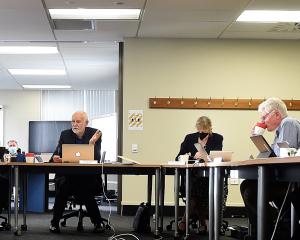The cash-strapped Southern District Health Board would have to spend ''precious funding'' on legal fees because of Michael Swann's continuing refusal to co-operate, the board's parole submission says.
Figures released under the Official Information Act reveal the SDHB spent $393,767 (exclusive of GST) in legal costs relating to Swann (51) over the past five financial years.
SDHB chairman Joe Butterfield noted in a parole submission ''the board is compelled to spend yet more precious funding in legal fees in an attempt to overcome the obstacle created by Mr Swann's lack of response''.
The lack of response relates to the ending of the board's civil proceedings against Swann and others connected with the case.
Those proceedings began in 2006 in a bid to preserve assets bought by Swann with fraud proceeds, while his criminal trial, conviction and the proceeds of crime proceedings left those civil proceedings no longer necessary.
Of the 18 people investigated in the case, only Swann and one of his close associates did not agree to a request that the civil proceedings be discontinued without the SDHB required to pay costs in accordance with High Court rules.
''Despite two written requests served upon him in prison, Mr Swann has not responded to the [health] board's request.''
The SDHB submission was sent after Swann's parole hearing last month, but was noted by the New Zealand Parole Board in its decision to release him to a Christchurch address later this month.
The SDHB, by raising its matters when dealing with Swann, ''might cause the parole board to reconsider the wisdom of granting parole to this prisoner'', the submission noted.
The parole board had to consider whether Swann would be at risk of reoffending during the remainder of his sentence, if paroled, the submission noted.
Swann was also the subject of a $6 million pecuniary order.
''Some, if not all of this, comprises assets which were purchased by Swann with the proceeds of his crime, but not recovered''.
''Mr Swann knows where those assets are.''
The submission also noted Swann swore an affidavit in support of a bail application, which included the following statement: ''I believe that reparation from me is a far better outcome than the [former] Otago District Health Board spending money on legal fees in pursuing further proceedings to secure judgement against parties who are not culpable.''
Bail was not granted.
''We are aware that he [Swann] and his associates have gone to great lengths to ensure the concealment of property purchased with the money that he stole from the taxpayer,'' the SDHB noted in the submission.
Swann's continuing failure to assist authorities with the recovery of assets since his imprisonment, despite his intentions professed at the time of bail, sentencing and forfeiture hearings, ''in our view demonstrate clearly that he lacks remorse and remains recalcitrant''.
''Considered in that light, it is difficult to see how the board can be confident that Mr Swann has been rehabilitated and is not at risk of reoffending if he is paroled.''
Swann, when he is released on July 31, would have spent four years and eight months in jail for his part in defrauding the health board of $16.9 million.
In May 2010, the Otago Daily Times reported the total paid by the former Otago District Health Board in legal expenses and other fees related to the $16.9 million fraud case was $1,631,891.
Advertisement












